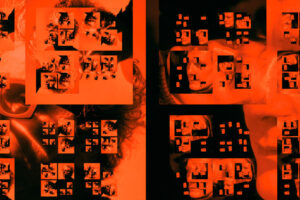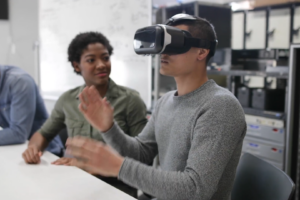
The UPC, once again present at the IoT Solutions World Congress
May 13, 2025
UPC will be present in the Smart City Expo World Congress 2025
October 6, 2025
The UPC, once again present at the IoT Solutions World Congress
May 13, 2025
UPC will be present in the Smart City Expo World Congress 2025
October 6, 202506/06/2025
On 5 June, the UPC Institute for Research and Innovation in Health (IRIS) has been launched, which builds upon the legacy of the Centre for Research in Biomedical Engineering (CREB). IRIS aims to become a leading centre in Catalonia for research and development in health technologies and medical innovations.
The Institute for Research and Innovation in Health (IRIS) at the Universitat Politècnica de Catalunya - BarcelonaTech (UPC) consolidates over 30 years of interdisciplinary research and technology transfer, inheriting the experience of the Centre for Research in Biomedical Engineering (CREB). Conceived in 1983 and formally established in 1997, CREB has become a pioneering research centre in the fight against disease, with a focus ranging from in-depth understanding of biological processes to the development of cutting-edge biomedical engineering. Since its inception, interdisciplinary research, technology transfer, and collaboration with the healthcare system, businesses, and other institutions have driven an intense scientific endeavour. The goal now is to expand the scope, vision, and impact of the centre, positioning IRIS as a key player in Catalonia's health research and innovation ecosystem.
With 12 accredited research groups and over 170 researchers based across five UPC campuses in the Barcelona metropolitan area, IRIS also addresses major global health and climate change challenges, recognising the increasing impact of these factors on human health.
The rise in diseases linked to pollution and inequalities in healthcare access are challenges that demand a technological and interdisciplinary response.
“IRIS was born to deliver real solutions to the major health challenges of today and tomorrow. We aim to be an active bridge between university research and the transformation of the healthcare system,” highlighted Alexandre Perera, Director of the Institute, during the launch event.
Solutions that improve healthcare and health
Among the institute’s most prominent research projects are: the design of nature-inspired antimicrobial bioceramics to combat bone infections; an artificial intelligence and robotics system set to revolutionise neurorehabilitation; the development of intelligent gas-based sensors for non-invasive monitoring of older adults; and new software for faster, more precise estimation of radiation doses, reducing risks in interventional radiology for both patients and healthcare personnel.
Research focused on transforming healthcare
IRIS promotes a collaborative, human-centred, and applied research model, focused on key priority areas, including:
- Artificial intelligence, robotics, and intelligent systems applied to disease prevention, diagnostics, personalised treatments, and support for healthcare professionals.
- Bioengineering, biosensors, biomechanics, and biomaterials for developing innovative medical devices, implants, and materials with clinical applications.
- Biomedical data analysis, bioinformatics, and predictive modelling to better understand diseases and improve decision-making, in both personalised medicine and public health contexts.
- Virtual reality and interaction systems used in rehabilitation therapies, professional training, and patient communication.
- Assistive technologies and rehabilitation solutions aimed at enhancing patients’ quality of life.
Transferring knowledge to the healthcare system
Beyond generating knowledge, IRIS is committed to turning research into practical and accessible solutions with real impact on the healthcare system and clinical practice. One of its key pillars is the Xartec Salut network, a structural initiative led by IRIS and supported by the Agency for Management of University and Research Grants (AGAUR) of the Government of Catalonia.
The network brings together 117 research groups from 29 institutions and acts as a platform for collaboration between universities, healthcare centres, companies, and innovation stakeholders. It drives technology transfer and fosters the creation of spin-offs to translate research into market-ready solutions that benefit society.
A strategic agent in the future healthcare ecosystem
With a clearly transformative vision, IRIS aims to establish itself as a strategic agent in the healthcare ecosystem, actively contributing to collaborative innovation policies and sustainable healthcare at both national and international levels. Future priorities include expanding strategic alliances with centres and excellence networks in digital health and medical technologies, and strengthening participation in European projects to increase research impact.
The Institute also seeks to foster the creation of new technology-based companies (spin-offs and start-ups) and promote the training of professionals capable of leading health technology innovation. This commitment to training and talent development is reflected in research-linked education programmes designed to bridge the gap between academia, clinical practice, and industry.
Launch event
The IRIS launch event took place in the main hall of the Barcelona School of Industrial Engineering (ETSEIB). It featured welcoming remarks from UPC’s Vice-Rector for Research, Pedro Díez, as well as presentations from the Institute’s Director, Alexandre Perera, and members of the IRIS leadership team: researchers Clara Prats, Josep Maria Font, and Carles Mas.
A roundtable discussion on the future of health technologies followed, moderated by IRIS Director Alexandre Perera. Participants included Roger Paredes, medical coordinator of UPC’s new Medicine degree and principal investigator of the Microbial Genomics Group at IrsiCaixa; Elvira Bisbe, President of the Barcelona Medical Association (CoMB); Rafael González, Head of the Knowledge Transfer Promotion Area at the Directorate General for Knowledge Transfer and Society of the Department of Research and Universities of the Government of Catalonia; and researcher Sergi Picart from Almirall.
During the event, tribute was paid to former CREB directors: Josep Anton Planell, Pere Caminal, and Daniela Tost.

Related Projects
- The AgroTech research group at the Universitat Politècnica de Catalunya – BarcelonaTech (UPC), together with its spin-off Ugiat Technologies, have driven DoblAI, an AI platform that integrates transcription, translation, subtitling and video dubbing into a single workflow. The solution, which uses deep learning technology and cloned or default voice models, is specifically designed for the journalism and communications sector.
- The AgroTech research group at UPC, in collaboration with its spin-off Ugiat Technologies, has developed uPlayer, a new multimedia player concept that enables more intuitive video navigation and viewing, intelligently enhancing the user experience, especially on YouTube and other platforms, by integrating as a plugin or advanced player.
- The Image and Video Processing Group (GPI), part of the IDEAI-UPC research group, and the Digital Culture and Creative Technologies Research Group (DiCode) from the Image Processing and Multimedia Technology Center (CITM) at the Universitat Politècnica de Catalunya – BarcelonaTech (UPC), have co-organised the AI and Music Festival (S+T+ARTS) together with Sónar+D and Betevé, to explore the creative use of artificial intelligence in music.
- The Visualisation, Virtual Reality and Graphic Interaction Research Group (ViRVIG) at the Universitat Politècnica de Catalunya - BarcelonaTech (UPC) has participated in the XR4ED project, an initiative that connects the educational technology (EdTech) and Extended Reality (XR) sectors, with the aim of transforming learning and training across Europe.




